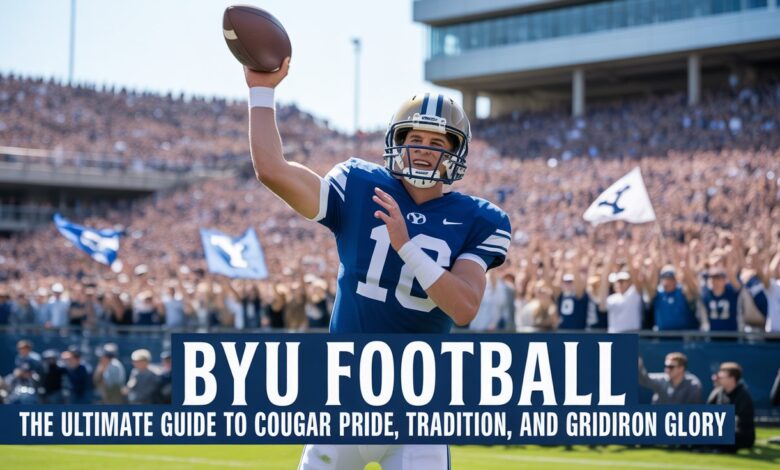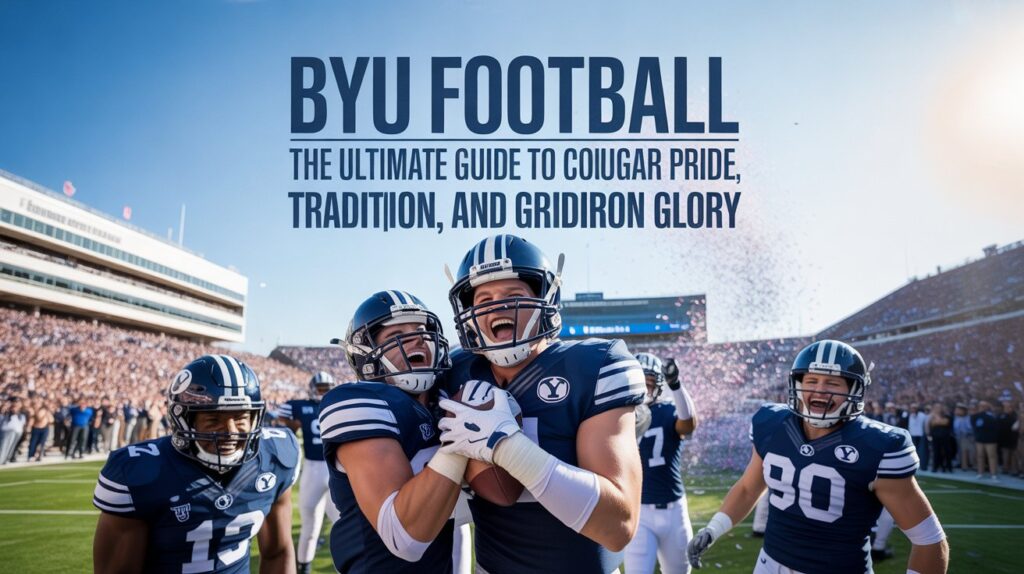BYU Football: The Ultimate Guide to Cougar Pride, Tradition, and Gridiron Glory

Introduction
BYU football isn’t just a sport—it’s part of a culture, a faith-driven mission, and a tradition of excellence. Whether you’ve worn the Cougar blue for years or you’re just diving into college football, Brigham Young University’s football program has a special way of drawing people in.
With its mix of values, strong coaching, devoted fans, and rich history, BYU football continues to stand out in the world of college sports. The Cougars have built a reputation for tough play, smart game plans, and character-driven athletes who give it everything they’ve got—on and off the field.
This guide brings the full experience to life. From legendary moments to rising stars, big rivalries to bowl appearances, this is everything you need to know about BYU football—as simple and exciting as talking to your best friend.
Let’s kick it off.
The Origins of BYU Football

BYU football began its long journey in 1922. Back then, the team didn’t have national attention, fancy uniforms, or packed stadiums. But each year brought growth, and eventually, BYU became a national name.
In the early days, the program played smaller schools in the Intermountain West. While results were mixed, the school’s passion for football never faded. Leaders kept building the program, brick by brick. The big turning point came in later decades when BYU began to make a mark in the NCAA.
Even today, fans look back on those early years with pride, knowing how far the Cougars have come.
The LaVell Edwards Era: Where Legends Were Born
Ask any Cougar fan about the greatest coach in school history, and one name will always come up: LaVell Edwards. He led BYU football for 29 years—from 1972 to 2000—and during that time, he changed the game forever.
Coach Edwards believed in throwing the football. While many ran the ball heavily, his teams passed aggressively and set records. Star quarterbacks like Jim McMahon, Steve Young, Ty Detmer, and others became national names because of his system.
During his time, BYU won a national championship in 1984, piles of conference titles, and countless hearts around the country. His kind leadership left a mark that still shapes the culture of BYU football today.
The school’s stadium—LaVell Edwards Stadium—now proudly carries his name.
LaVell Edwards Stadium: A True Home for the Cougars
Nestled in Provo, Utah, LaVell Edwards Stadium is the proud home of BYU football. Surrounded by the Wasatch Mountains, this stadium offers one of the most beautiful backdrops in all of college football.
With a seating capacity of about 63,000 fans, the atmosphere on game day is electric. Fans wear navy blue, chant “Rise and Shout”, and cheer loudly on every down. Whether it’s a sunny October day or a chilly November night, the Cougar faithful show up strong.
The field is also a training ground for future stars and a place where memories are made. Win or lose, standing in that stadium is something Cougar fans never forget.
The Big 12 Conference: BYU Joins the Big Leagues
In 2023, BYU football officially joined the Big 12 Conference—a major step for the program. For years, BYU played as an Independent, meaning they weren’t tied to a specific league.
Joining the Big 12 brings more national exposure, higher stakes, and tougher competition. Teams like Texas (before their exit), Oklahoma, Kansas State, and Baylor are now part of the weekly challenge.
This move makes recruiting stronger, rivalries fresher, and games even more exciting. For longtime fans, it feels like a reward after years of commitment and growth. For the players, it’s a bigger spotlight to prove what BYU football is made of.
The 1984 National Championship: A Storybook Year
One of the proudest achievements in BYU football history is the 1984 national title. That season, the Cougars went undefeated (13–0), beat Michigan in the Holiday Bowl, and finished as the No. 1 team in the nation.
Led by quarterback Robbie Bosco and backed by a solid defense, the team overcame injuries, stiff opponents, and media doubts. At the end of the season, however, there was no denying their talent and heart.
This moment gave BYU national recognition and proved that a faith-based school out of Utah could hang with the biggest programs in the country. That title still inspires players and fans alike today.
Rivalries That Fuel the Fire
Every great football program needs rivals. For BYU football, the biggest rivals are:
Utah (The Holy War)
This is the most famous one. BYU vs. Utah is always intense, sometimes wild, and always emotional. They may be neighbors, but on game day, it’s all-out war.
Boise State
The Cougars and Broncos have had some thrilling battles over the years, often with high-scoring offenses and close finishes.
Utah State
Dubbed the “Battle for the Wagon Wheel,” this in-state rivalry brings history, passion, and plenty of bragging rights.
These rivalries remind players and fans how much pride is on the line—and nothing fires up Cougar Nation like beating a longtime foe.
BYU’s Quarterback Legacy
BYU football is known as “Quarterback U” for a reason. Through the decades, the Cougars have produced some of the best QBs in the game.
Notable Names:
- Steve Young – Hall of Fame quarterback who starred for the San Francisco 49ers.
- Jim McMahon – Super Bowl winner with the Chicago Bears.
- Ty Detmer – Heisman Trophy winner in 1990 and college football legend.
- Zach Wilson – Star quarterback drafted No. 2 overall by the Jets in 2021.
This tradition keeps alive today, as BYU continues developing quarterbacks who are smart, strong, and ready for the big leagues.
Life as a BYU Football Student-Athlete
At BYU, playing football also means living by high standards. The school follows an honor code based on faith, discipline, and kindness. Players commit to things both on and off the field—like academic success, personal behavior, and respectful conduct.
This code helps student-athletes build character and grow into leaders. That’s why so many players say their years in BYU football helped shape their entire lives.
From practice to class to community service, Cougar players take pride in giving their best in every area.
Modern Coaches and the Future of BYU Football
After LaVell Edwards retired, BYU football went through several coaching changes. Big names like Gary Crowton, Bronco Mendenhall, and Kalani Sitake have each led the program in different ways.
Coach Kalani Sitake
Hired in 2016, Kalani is the first Tongan head coach in college football history. A former BYU player himself, he’s known for his energy, heart, and love for players.
Since taking over, he’s brought stability, tough recruiting, and a fun style of play—especially on offense.
With the move to the Big 12, fans are excited to see what Kalani and the Cougars do next. The future of BYU football looks bright.
Player to Pro: BYU’s NFL Pipeline
Many BYU football players go on to the NFL every year. Scouts love the Cougars’ discipline, conditioning, and football IQ. BYU athletes come prepared for pro success.
Recent Pro Names:
- Zach Wilson – New York Jets QB
- Tyler Allgeier – Atlanta Falcons RB
- Taysom Hill – New Orleans Saints utility player/stunner
- Fred Warner – Star linebacker for the San Francisco 49ers and team captain
These stars help keep BYU in the spotlight—and guys dreaming right now of wearing Cougar blue can see it’s possible to go from Provo to the pros.
Faith, Family, and Football: The Cougar Way
What makes BYU football different? Faith is a big part of the story.
BYU is sponsored by The Church of Jesus Christ of Latter-day Saints. Many players serve two-year church missions before rejoining the team. These missions help them grow as people and develop leadership skills.
Also, family plays a huge role. Parents, siblings, and fans stay closely connected to the program. This strong community support shows up in the stands, in local businesses, and all over Cougar Nation.
It’s not “win at all costs.” At BYU, football is part of a bigger picture.
FAQs
1. When was BYU football founded?
BYU’s football program began in 1922. Over the years, it’s grown into a nationally respected program.
2. What is BYU’s biggest football rivalry?
The biggest rivalry is against the University of Utah, often called the Holy War.
3. How many national championships has BYU won?
BYU won its only recognized national title in 1984 after finishing the season undefeated.
4. Is BYU part of a football conference?
Yes. In 2023, BYU joined the Big 12 Conference, taking on some of the toughest teams in the country.
5. Who are some of BYU’s famous football alumni?
Some of the best include Steve Young, Ty Detmer, Jim McMahon, Fred Warner, and Zach Wilson.
6. What makes BYU football unique?
The program stands out for its blend of faith, values, strong tradition, and commitment to developing athletes inside and out.
Conclusion
BYU football is more than tackles, touchdowns, and trophies. It’s about something deeper—faith, grit, pride, transformation, and brotherhood. It’s the roar from LaVell Edwards Stadium, the tears after a big win, and the unity built through decades of tradition.
With a past full of legends and a future full of promise, the Cougars continue to rise. From Provo to Texas, from fan tailgates to NFL dreams, BYU football keeps bringing people together.





